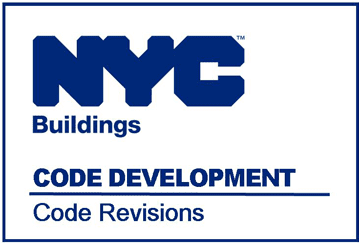2022 NYC Building Code Requirements
September 9, 2022

Fire-blocking of Combustible Wall Assemblies
Related Codes, Sections & Resources: BC 718.2.6, BC 718.2.6.1, BC 718.2.6.1.1, BC 718.2.6.1.2, BC1401.2, BC 1403.5
The 2022 NYC Building Code (BC) will be effective as of November 7, 2022, and includes new fire-blocking requirements applicable to exterior wall coverings, specifically those composed of combustible materials.
What is an exterior wall covering?
An exterior wall covering is a material or assembly of materials applied on the exterior side of exterior walls for the purpose of providing a weather-resisting barrier, insulation or for aesthetics, including but not limited to, veneers, siding, exterior insulation and finish systems, architectural trim and embellishments such as cornices, soffits, facias, gutters and leaders.
Fire-blocking is required within concealed spaces of exterior wall coverings, including exterior wall assemblies that contain combustible components even when such wall assembly previously passed the NFPA 285 test. Noncombustible fire-blocking is required around wall openings, at the floor level for a height of not less than 8 inches, and between different occupancy groups – vertically or horizontally as applicable. The fire-blocking shall be of adequate thickness to cut off concealed gaps and form an
effective barrier.
Construction documents must include documentation of the NFPA 285 tested assembly from the manufacturer for the proposed exterior wall assembly.
Construction documents must also include a statement from the applicant certifying that any deviation will be evaluated and approved, and no deviation would result in an assembly that would otherwise fail to pass the acceptance criteria of NFPA 285.
Testing
The 2022 BC does not prescribe how test specimens for the NFPA 285 test are to be assembled, including the exact location of any required fire-blocking. Instead, NFPA 285 states that details of the construction of the test specimen shall be in accordance with the manufacturer’s instructions and the construction of the wall assembly should be typical of actual product use.
For more information and clarification of the 2022 NYC BC requirements for fire-blocking of combustible wall assemblies and for construction documents and deviations, click here.
Boilers
Related Codes, Sections & Resources: AC 28-413.1
Section 28-413.1 requires that a high-pressure boiler must be operated under the direct and continuing supervision and in the presence of a high-pressure boiler operating engineer. However, this section allows operation of high-pressure boilers without the direct and continuing supervision of a licensed high-pressure boiler operating engineer where all the conditions in the exceptions are met.
This section also states that a high-pressure boiler operating engineer license required. It shall be unlawful to operate any high-pressure boiler for any purpose whatsoever, in the city of New York or in connection with any vessel on the waters in and around the city not subject to the jurisdiction of the United States, unless such boiler is operated by or under the direct and continuing supervision and in the presence of a person having a high-pressure boiler operating engineer license.
Exceptions:
- The boiler is a stand-alone boiler.
- If the boiler is a steam boiler, the boiler has less than 100 square feet (9.3 m2) of heating surface.
- If the boiler is a steam boiler, it is capable of generating less than 1750 pounds (794 kg) per hour of steam; or if the boiler is a hot water boiler, it is capable of generating less than 2 million btu/h of hot water.
- The boiler has a safety relief valve setting of 200 psig (1379 kPa) or less;
- The boiler room enclosure is in compliance with Section 508 of the New York City Building Code.
- There is a carbon monoxide detector in the boiler room.
For more information on this section and a breakdown of these exceptions, click here.
HLZAE has extensive experience in the investigation and renovation of building envelopes and structural systems. Additionally, we have a full-service MEP Department that specializes in Boilers and HVAC Equipment. Please feel free contact us for assistance regarding the 2022 NYC Building Code Requirements, or any other project related questions.
Recommended Articles
Sorry, we couldn't find any posts. Please try a different search.